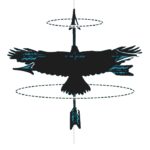What Echoes Will Always Come Back: A Lesson With Hillary Leftwich
Imagine a moment in your life that never resolved itself. The circumstances surrounding this one event may still haunt you into the present. What images, words, situations, and people were involved? Why were you not able to gain closure? Things left undone, people we’ll never see again, scenarios that were never resolved, all these things continue to echo in our lives, good or bad (and they don’t have to be bad). Closure doesn’t always come in the physical form. Many times, throughout our lives, we’ll find the closure we need after a series of echoes. The ending we want our readers to feel is this same echo: the feeling that there is no resolution. This is what you want. If the reader continues to think about your piece and doesn’t feel that ending that’s summed up neatly, it will stay with them. As storytellers and poets, this is part of our job.
Read the two stories included with this exercise that both utilize the echo ending technique. How does the writer utilize their images, scenes, and pace to build up to the ending that doesn’t end? Pay close attention to the final lines and how they nail that final echo. It’s not just about the ending, it’s about everything that precedes this as well.
Story Example #1: From Gone Lawn Journal
I am six almost seven when the twister comes do you see it do you see it my brother asks it must be as far away as dickinson or fargo the hill we live on gives a view of the flat land and on it this afternoon with the sky gone gray as night this twister is a manic marauder a cone-shaped thing aladdin’s angry genie unleashed will it take us I ask you’re such a scaredy cat my brother says but he doesn’t realize I’m not really afraid he sleeps downstairs and can’t hear their fights mom’s muffled shrieks her squeals mirror glass shattering atop their dresser pipe or fist hitting the wall going through it on the other side of mine my little indian warrior clock with its big brown eyes coming free of its nail breaking off one pony tail when it hits the floor and bounces dead as I always knew hate you hate you I hate you she screams and so he hits her my father does hits or slaps I’m leaving you you’re a monster oh yeah I’ll show you a monster last night was the worst every evening is bad but last night the floor shook bombs exploded I expected smoke expected flames to burn their room to cinders but breakfast came and mom was at the stove frying flap jacks wearing a head scarf and jackie o sunglasses smoking silent as a hollow log saying stop your gawking and eat go on you let it get cold and I’ll whoop you sure as satan and now in the distance the cyclone is swiveling its smoke hips and I imagine it sucking up barns and buildings and houses with screaming children and astonished parents milk cows and chickens hogs farms being rolled up like rugs the moss place folger’s farm chicory square all of them slurped up that massive funnel of dirt while I wait our turn kenny says we better get downstairs come on you stupid turd I shake him off fine go ahead and die see if I care he might mean it he might know more than I think there the twister jerks pivots like a spastic ballet dancer made of dust moving through smolinski’s plot swiveling mowing pulverizing breaking things apart wherever it finds them a motorcycle comes flying this way hurled a mile through space like a chrome asteroid this is it this is it this is deliverance this is god acting saying I’ve heard your prayers this is his wrath that I’ve read about only at the bottom of bell street where the coolie sits the twister veers east without warning east east why east I’ve been waiting my whole life my short life willing eager to give it up and there you go god there you go you do not exist don’t tell me any more lies there you go no different than the gray ghost vapors my mother blows out of her nose when she smokes mom dad and me the fight between three maybe not tonight but tomorrow tomorrow the twister will reappear a different cyclone but just as savage and cruel and it might finally be the one that takes me the one that ends it all.
In this piece, Len uses the one paragraph without stopping. This works well with building up his echo. It feels as if he’s blurting it out to the reader in a frenzied panic, and it really does a fantastic job of creating the tone necessary for that final impression. Do we know what happens with the cyclone? Does it take him? There’s the echo.
In the move Moonlight, Chiron’s life is described in three chapters throughout his life. In this clip, Chiron’s father figure, a man named Juan, teaches him how to swim in the ocean. Walking through the scene, the ocean is a tool used throughout the film to describe both strength and vulnerability. It can also be seen as a way to move beyond relationships. In this scene, Juan is not his father, yet, the scene reveals Chiron’s struggles with his own masculinity and sexual identity. In the play as well as the movie, the echo is apparent throughout the movie by utilizing vivid scenery to connect the reader/audience with what is to come.
https://www.youtube.com/watch?v=z6yMItXePG8
Story Example #2: From Tin House Flash Fridays
He Was Trying to Say Something and He Couldn’t Get It Out by KAJ TANAKA
When I get home from school, I find my dad sitting in the living room with an Old Style in his hand. He says it’s only his second and I say okay. He says he got off work early today, which he sometimes does, and I’m like sure okay. He looks bad, and I don’t want to be there, but I can see he wants to say something. There’s this box on the table. “This is all the letters your mom sent me when I was in Iraq,” he says. “I don’t want them anymore. I was thinking of burning them today but I thought you—” He pushes the box away and reaches for his beer.
You’re born, you have a dad, you have a mom, you get older, you lose them, maybe somewhere along the way you have kids of your own, maybe someday they lose you. When they tell you that story, it sounds easy, but none of it is a straight line.
“You might not think you want to read them,” my dad finally says to me. “But this is—this is the person she was, who you didn’t know. You’re going to have questions. You got to hide these somewhere in your room. Read them when you’re ready. Otherwise, I’ll burn them. I can’t have them around anymore. Understand?”
For more examples of echo endings, read this article from Electric Literature:
Kristen Arnett has an amazing example of an echo story titled, “Gator Butchering for Beginners” which is a bit longer than an average flash piece, but the echo is incredible and worth a read to get an idea of how she uses this technique throughout her piece.
Exercise!
If you like, take a piece you have already written or started on to use for this exercise. Utilize aspects of this, if you choose, to setup your echo piece. What can you foreshadow in your opening to help with a strong echo? Certain tools can be used to help you along the way:
Focus on one scene at a time. It’s important to have the reader’s eyes on one moment in time. In the movie clip from Moonlight, the director focused on one scene and kept it simple, yet, it’s enough to echo throughout the movie. Find and focus on one scene you feel will have the most impact on your reader.
We all know foreshadowing is a huge tool to use our writing. To be able to circle back around to a beginning thought or image, then echo that in your ending really has a double impact. Find images or scenes in your opening scene in order to use this technique.
If you’re stuck, try writing your piece in one of the two ways our writer excerpts did. Len Kuntz did the “one breath” technique, laying every moment of one single scene in one quick succession, no stopping points. Kaj Tanaka uses a layering effect between dialogue, his own thoughts as an afterthought, and then back to dialogue. Remember, final words can have an incredibly strong echo-impact on your reader.
—
Hillary Leftwich is the author of Ghosts Are Just Strangers Who Know How to Knock (CCM Press/The Accomplices 2019), which is featured in Entropy’s Best Fiction list of 2019. She is the poetry and prose editor for Heavy Feather Review and runs At the Inkwell Denver, a monthly reading series. Currently, she freelances as a writer, editor, and teaches writing at Lighthouse Writers. Her writing can be found or is forthcoming in print and online in The Rumpus, Entropy, The Missouri Review, The Denver Quarterly, Big Other, and others. She is a scholarship recipient for The Kenyon Review’s Writers Workshop for nonfiction and will be a featured visiting writer at Western Illinois University in 2020. She lives in Colorado with her partner, her son, and their cat, Larry. Find more of her writing at hillaryleftwich.com
Artwork by: Kayvan Mazhar

